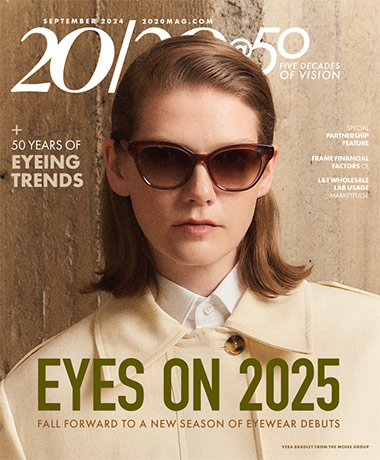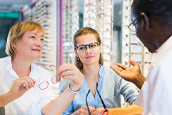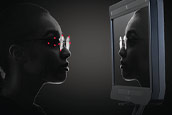So, you’ve just helped your patient choose the most beautiful, technologically advanced, perfect pair of eyewear. You’ve adjusted them to fit like a glove, and you’re ready to send your patient out into the world with this new optical masterpiece. Here’s the question, have you properly prepared this patient for all that is waiting for them in the real world? Not sure what information is imperative? Let me help.
Newborn Eyewear
I like to compare new eyewear to a brand new baby just brought into the world. (Granted, I am a bit protective of the eyewear I make, I get excited when they get to go home to a good family. I know, I am a bit of an overbearing Mama Bear when it comes to eyewear, but it’s a good thing when educating the patient on how to care for them. If the patient feels you cared for the glasses you made for them, they’re going to feel obligated to do the same).
After we’ve done all of the preliminary work to get accurate measurements and chosen the correct products based on this patient’s needs, we have created this precious pair of eyewear. Now we’re ready to show our patient their newborn baby eyewear. This should be done with as much care as a nurse bringing the new bundle of joy to his eagerly waiting parents.
Have The Discussion
Ok, so you’ve done the dispense, you’ve delivered this newborn eyewear to the waiting parent and now is the time to discuss what the real world holds in store for them. To start the conversation, I give gifts. I give the patient spray cleaner and cleaning cloths and open with the following statement. “I know what you’ve paid for these glasses; let’s keep these beautiful glasses looking as great one year from now as they do right now. Let me show you how.” At this point, the patient is eagerly nodding, as though saying, yes, let me know how to do that.
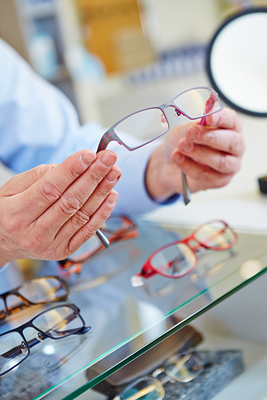
Step One
Get your glasses wet every time you clean them. No if’s, and’s, or but’s. Getting your glasses wet every time you clean them allows you to rinse any surface debris off the lenses, giving you a clean surface to wipe dry. Why is that important? Because any particulates or debris on your lenses will abrade them just as sandpaper would when rubbed with any pressure. So you never, never, never wipe your lenses without rinsing them off first. In my opinion, and in my store we recommend they use the spray cleaner we provide and if that is not available, we recommend they use simple tap water to remove any debris. We caution patients never to use any chemically based cleaners such as household cleaners or window cleaner. We recommend you do a sniff test, and if whatever you are thinking about spraying on your lenses smells like a chemical, it likely is, and you shouldn’t use it. Step one is arguably the most important step in cleaning and caring for your new glasses.
Step Two
Wiping your lenses dry is such an important thing, and the cleaning cloth is the only thing that should ever come into contact with your lenses. The cleaning cloth’s entire reason for existing is to care for your lenses. Your t-shirt has many, many uses - none of which are for cleaning your lenses. I usually make a joke here “Every time you use your t-shirt to clean your glasses, somewhere an Optician cries. We’re nice people, and you wouldn’t want this for us, right??”
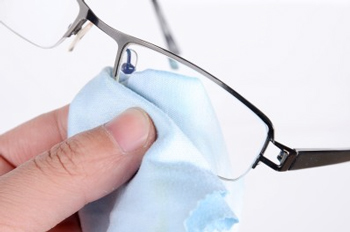 I also recommend that cleaning cloths be treated as though they are gold. They should be washed by hand with hot water and a bit of shampoo. Shampoo doesn’t leave the residue that many commercial laundry detergents do, which is why I don’t recommend you wash them with your normal laundry. And excess residue leads to cloths that aren’t really clean and leave you with smudgy smeary lenses. Worst case scenario, I always offer to give the patient a new cleaning cloth if they are unable to get theirs clean. It is often hard to get your lens cleaning cloths clean when patients use a lot of hand cream or tend to have oily skin. (And since my cleaning cloths have my practice name and address on them, I think of that as a bit of marketing too).
I also recommend that cleaning cloths be treated as though they are gold. They should be washed by hand with hot water and a bit of shampoo. Shampoo doesn’t leave the residue that many commercial laundry detergents do, which is why I don’t recommend you wash them with your normal laundry. And excess residue leads to cloths that aren’t really clean and leave you with smudgy smeary lenses. Worst case scenario, I always offer to give the patient a new cleaning cloth if they are unable to get theirs clean. It is often hard to get your lens cleaning cloths clean when patients use a lot of hand cream or tend to have oily skin. (And since my cleaning cloths have my practice name and address on them, I think of that as a bit of marketing too).
Of course, we also go over the obvious things to avoid, like, never use anything on your lenses that used to be a tree (i.e. tissues, paper towels, toilet paper.) I usually follow that up by reminding the patient that you wouldn’t use just anything to dry your car off after washing it, you’d be worried that you’d scratch your car, why would you treat your glasses differently?
Following up
I also recommend to the patient that their glasses will need adjustments from time to time. This is just real life. You get bumped, you drop your glasses, life happens. However, don’t worry, we are here, and we are happy to take care of those things for you. Also, changes in temperature will affect how your glasses fit. Extreme heat will cause them to stretch and loosen a bit, and not to mention that shifts from cold to hot can cause the screws to loosen in them also. So we recommend you come to visit us four times a year or every time the seasons change to keep your eyewear in perfect working order. Of course, if you need to see us more frequently for other life-induced reasons, we’re happy to help then also.

By setting the expectation with your patient on how you expect them to treat their eyewear you are creating a customer who knows how to care for their eyewear and who understands the value of well-made products. If you don’t set this expectation, they come back to you wondering why their lenses are a scratched up mess that they can’t see through. This patient mistakenly thinks you sold them a bad product, but the truth is you just didn’t prepare them for real life. If you teach your patient how to care for their new baby, they will understand that they’ve invested their money wisely on their eyewear and will treat their investment carefully. This patient is happier upon return because their glasses behaved as you told them they would. The real world is waiting for your patient. Help them be prepared for it.

Johnna Dukes, ABOC is currently the owner and operator of an optical boutique, with experience in both the private practice sector as well as the retail chain setting. She has a wide range of experience varying from optical support staff to dispensary management to practice ownership. She lives in Okoboji, Iowa.



